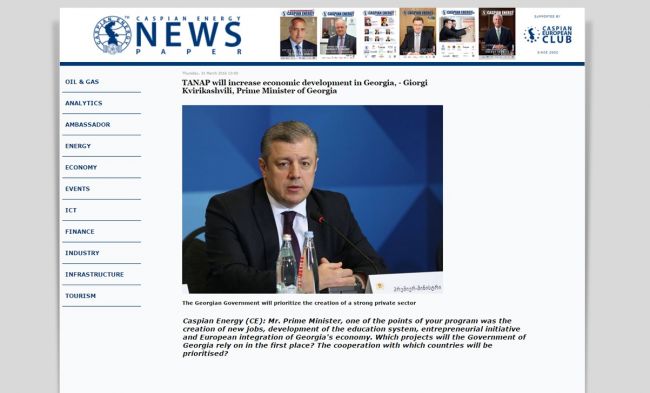2016-04-04
The Georgian Government will prioritize the creation of a strong private sector
Caspian Energy (CE): Mr. Prime Minister, one of the points of your program was the creation of new jobs, development of the education system, entrepreneurial initiative and European integration of Georgia's economy. Which projects will the Government of Georgia rely on in the first place? The cooperation with which countries will be prioritised?
Giorgi Kvirikashvili, Prime Minister of Georgia: The Georgian Government sets the achievement of long term economic growth as a central priority. The private sector, as you know, is the main driving force for the economic development of any country. A strong and competitive private sector not only guarantees the economic strength of the country and creation of new jobs, but also establishes a solid basis for better positioning of the country worldwide. Therefore, the Georgian Government will prioritize the creation of a strong private sector. All the initiatives in our plan serve that very purpose, with tax reform, improvement of public services offered to the private sector and more transparency in the legislative process being among the first. As for European integration, this is of course the ongoing number one priority for the Georgian Government.
CE: How do you see Georgia in 10 years?
Giorgi Kvirikashvili: My job is to move the country forward. This government's goal is to make the dream of a better life a reality for all Georgians. While we've made significant investments in the healthcare, education, and agricultural sectors that have improved people's well being, there is still more work to be done.
We seek to grow our economy to provide more jobs, while advancing European integration in order to provide concrete benefits to our people, such as visa-free travel to Europe.
I am confident that ten years from now Georgia will be a modern, dynamic European nation with strong, entrenched democratic institutions. Our growing economy and increased integration with Western institutions will provide the Georgian people a vast array of new opportunities, both personal and professional.
I believe Georgia will be prosperous country that capitalizes on its geographic location as a vital link connecting East and West, and North and South. Then years from now, Georgia will be a major hub for trade throughout the region and a key player in global commerce.
Overall, I expect Georgia to continue to make its mark as a nation that facilitates peace among neighbors as well as commerce between continents.
The Association Agreement should enter into force in the very near future
CE: Will you further expand the legal framework of the relations with the EU?
Giorgi Kvirikashvili: The Association Agreement signed with the EU in June 2014 is an entirely new generation agreement. Through political association and economic integration, the agreement creates vast opportunities for development in Georgia and greater approximation with the EU in all main sectors. With this agreement Georgia has committed itself to the gradual introduction of European norms and standards in the political, economic, social and legislative sectors. This will contribute to improving living standards in Georgia, boost economic growth, as well as guarantee unconditional protection of political and economic freedom. The Association Agreement, once in force, will become the core legislative framework governing EU-Georgia relations. Currently, all EU member states and the European Parliament have ratified the agreement. It should enter into force in the very near future. Today, the Georgian government has the crucial task of effectively implementing the agreement and ensuring that our citizens receive the maximum benefits from the prospects opened by the document - particularly through the establishment of a Deep and Comprehensive Free Trade Area with the EU.
Georgia has also signed a number of agreements with the EU covering specific sectors of cooperation, including the Common Aviation Area Agreement which provides for the progressive liberalisation of air transport and mutual market access, a framework agreement allowing Georgia to participate in EU crisis management operations, and a Protocol on Georgia's participation in EU programs. A crucial priority on our bilateral agenda is the agreement on visa liberalization for Georgian citizens, which has finally entered into the formal stages with the proposal by the European Commission last week.
CE: What influence will the migration crisis in the EU have on deepening EU-Georgia relations?
Giorgi Kvirikashvili: Georgia has been engaged in visa dialogue with the EU since June 2012. Through tireless efforts, the Government has successfully completed and surpassed all benchmarks set out in the Visa Liberalisation Action Plan. This was recognized in the fourth and final progress report published by the European Commission last December. Through reforms Georgia has established a solid legislative policy and institutional framework for secure and well-managed migration, in full compliance with European and international standards.
For instance, we developed and are implementing the human rights strategy and action plan as well as the anti-discrimination law and a new Civil Service Law. We have taken important steps to strengthen the independence of the Prosecution service and of judges, created a Labour Inspectorate Department, improved asylum policy and migration management, launched an intensive information campaign on legal migration, etc. Thus, we do not consider that the current migration crisis will in any way affect EU-Georgia cooperation in the sphere of freedom of movement - Georgia has taken substantial measures to avoid any negative impacts and has met all technical requirements set out in the VLAP.
It should also be noted that only Georgian citizens with biometric passports, will be able to enter the EU for up to 90 days without a visa. The rule would apply to the Schengen area, but would not allow Georgians to work in the EU.
Commercial consumers have the option to choose their supplier based on commercial terms
CE: Could you please tell about the investment priorities of the Georgian Government?
Giorgi Kvirikashvili: The top priority sectors for investment in Georgia are agriculture, energy, tourism and transport and logistics. I would like to emphasize in particular the energy sector, as growing energy use in our country together with the massive untapped hydro resources provide a sound basis for attracting foreign investments. Moreover, highly developed interconnections with neighbouring countries and access to competitive export markets enable us to further develop our domestic hydro resources through simplified and transparent regulations. The Government has signed dozens of MOUs with investors, looking to develop about power plants of all sizes.
CE: TANAP's construction is starting this year. What are Georgia's expectations from the Southern Gas Corridor project?
Giorgi Kvirikashvili: Construction works for TANAP are in progress. At the initial stages of production, TANAP will increase volumes of gas transported through the Southern Gas Corridor from 6 to 22 BCM per year. As a result, an additional 0.8 BCM of gas will be available on the domestic market. The Southern Gas Corridor will be further expanded with the aim of also transporting Turkmen gas. Once the planned projects and regional initiatives are fully operational, Georgia's role as a reliable transit country will further increase, together with strengthened energy security and economic development.
In addition, this major project will increase economic development in Georgia. SGC Consortium is investing millions in Georgia to upgrade the infrastructure, which creates jobs and supports widespread industrial development.
CE: Why has Georgia decided to revise the long-term gas relations with Azerbaijan today - for political or economic reasons?
Giorgi Kvirikashvili: Georgia does not seek an alternative long-term supplier of natural gas. The strategic energy partnership between Georgia and Azerbaijan started 20 years ago through successful implementation of oil and gas transportation projects like Baku-Tbilisi-Supsa (WREP), BTC (Baku-Tbilisi-Ceyhan) and BTE (Baku-Tbilisi-Erzerum). Azerbaijan, through a number of contracts supplies 90% of the Georgian gas market. After the commissioning of Shah-Deniz phase 2, Georgia will get additional volumes of gas through long-term agreements signed with the Consortium. Before this date, the contract signed with SOCAR on 4th of March, 2016 will provide an additional 500 mln of natural gas to be supplied to "social" sector (households and thermal generation) through the SCP (South Caucasus Pipeline) until 2030. The commercial sector is deregulated and commercial consumers have the option to choose their supplier based on commercial terms.
"Georgian Railway" will ensure that the Caucasus is connected with Europe and Scandinavia
CE: What problems do you see on the way of implementation of the transport corridor from China to the EU? How would you comment on its expansion to the EU (Lithuania) and the Viking route?
Giorgi Kvirikashvili: The main challenge for implementation of the transport corridor from China to EU is to install the necessary "hardware" - transport and logistics infrastructure. In parallel, a lot of progress should be made on acquiring the "software" of international trade. This mainly concerns legislative approximation, efficient border management and customs procedures, and, last but not least, free trade agreements with our main trading partners. Moreover, it will be of utmost importance to establish clear and transparent tariffs along the whole corridor.
One of the biggest challenges for the Government of Georgia is to strengthen the transit function of the country and the formation of a logistical hub in the region. Therefore it will be crucial to ensure that transportation of additional cargo flows from China to Europe can go through Georgia without any obstacles. There is a huge potential for Georgia to capture significant volumes from various alternative routes. The current situation in the region, with various Silk Road initiatives aiming to promote trade, economic cooperation and development, is very promising.
The Government of Georgia is an active member of several international transport corridors, such as TRACECA, LAPIS LAZULI, and the Baltic Sea-Black Sea International Transport corridor, which have a key role to play in the revival of the ancient Silk Road. The Government of Georgia and the People's Republic of China agreed to cooperate on the Silk Road Economic Belt initiative.
I would like to note with satisfaction that during 2015-2016, railway freight transportations from China in the direction of Georgia were carried out on several occasions. As a result of fruitful cooperation between the Georgian, Azeri, Kazakh and Chinese railways, tariffs were introduced for the entire corridor, which created an opportunity for the transport of freight from China to the Black Sea ports of Georgia in the shortest possible time. As a result, transit time has been reduced from 40-45 to 7-9 days. Transit networks running through Georgia can bring goods from China to Europe much faster than sea routes.
There are several important advantages to the VIKING train project: its intermodal nature, its fixed schedule that allows for interoperation with other modes of transport, its competitive cost compared to alternative modes of transport, the minimum time required for paperwork and customs clearance procedures at the border, and the minimum delay for delivery of goods to their destinations.
The Georgian side signed the protocol on accession to the multilateral "Agreement of Development of cargo shipment towards Baltic Sea - Black Sea" on 15 March 2011 in Kiev (entered into force in 19.03.12). Georgian Railway became a full member of the Viking project in April 2015, with the Bulgarian navy and the Finland-based company Containerships as associate members and Gefco Company and Steveco Logistics as new operators through Turkey, Sweden and Finland. Members of the project, especially the Georgians, are interested in the accession of Azerbaijan to the VIKING project.
Joining JSC with "Georgian Railway" will ensure that the Caucasus is connected with Europe and Scandinavia as well as improve the conditions of mutual transit of goods between the participating countries of the TRACECA program and in the East-West, North - South directions. It will also create alternative transportation routes for trade between Europe and Asia.
In the framework of the Viking project, the first container train was launched from Illichivsk, Ukraine on 15 January for a test journey through Georgia, Azerbaijan and Kazakhstan to China, across the Caspian and Black seas. The test train was launched after signing a protocol on January 14, 2016 among Azerbaijan, Kazakhstan, Georgia and Ukraine on setting competitive preferential tariffs for cargo traffic via the Trans-Caspian international transport route.
CE: How will the circular economy and the alternative energy sector develop in Georgia?
Giorgi Kvirikashvili: Beyond vast hydro resources, other alternative energy resources will be developed, but it should be noted that hydro power plant projects are more competitive than wind and solar energy. Despite this, the first wind project, with a capacity of 20 MW, is currently under development and will have the potential to be expanded to up to 100 MW. Net metering regulation has been recently launched to provide incentives at the end-user level. A number of projects aimed at using biomass and geothermal resources are also being considered to provide heat to rural and off-grid settlements.












